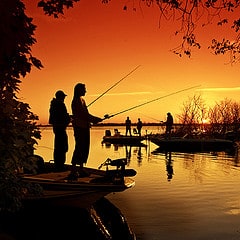I have had my girls out fishing with me, trying to teach them the art of threading their bait, casting, PATIENCE, when to strike, what to keep and what to throw back.
While having them fishing and talking to them about the many aspects of fishing, I was struck by the parallels of fishing to life in general.
Selecting and presenting the bait.
To catch a fish you have to know what to use, and you have to know how to present the bait to the fish to entice them to bite. Life is also like this. You have to learn what makes other people tick, you have to know how to present information to them in a way that makes it attractive to them and entices them to take the information.
This can only be achieved by studying people in their environment and learning what encourages them, what distracts them, what spooks them and how do you imitate these various triggers to motivate them to cooperate with you in life.
But you also have to know these things about yourself….. otherwise you may be taking the bait presented by someone else, and you might find yourself hooked!
Casting.
Casting involves a fine art of learning a series of steps and getting them in the right order at the right time to put your bait in the right place, ie where the fish are. Sometimes this is in the open, sometimes in and around the snags, sometimes in the deep, sometimes in the shallow.
Deciding where you are going to aim your life is like casting. If you are always aiming for the clear calm waters you may be missing many chances to catch a lot of life’s opportunities.
Opportunities are often in places you would not expect to find them, so sometimes you need to be in life’s shallows, sometimes you need to be in lifes’ muddy waters, sometimes you need to be in and around the snags in life to see them.
Patience
I have written before about patience, and the fact that it is not a passive pursuit, but rather an active and engaging process.
When fishing you really must be working at your patience. One thing kids love to do is to be casting and winding in….over and over and over again. It takes a while for them to appreciate that after you cast you have to have a period of patience. You need to allow time for the bait to settle where it needs to be and for the fish to become aware of it, and to assess whether it looks enticing enough to take a bite of.
Sometimes the length of time needed to exercise patience is short, sometimes it is lengthy but you need to be actively engaged in the act of patience and constantly aware of what is happening around you or you will never know …..
When to strike
Some species of fish are aggressive and attack the bait, some are fidgety and will nibble without too many clues that they are there, even though they are nibbling away at your bait.
If you strike to quick you can miss your fish by failing to set the hook, if you take too long you can be left with and empty hook and no bait.
Life’s opportunities are like this too. If you are too eager you might strike too early and snatch defeat from the jaws of success, if you wait too long others may have eaten up the opportunity and left you waiting on an empty hook.
Lets face it in life we are going to act too early or wait too long on a lot of occasions. But by being open to continual learning you will help improve the number of times you do manage to get the strike time just right, and when you do you also need to know….
What to keep and what to throw away
When fishing there are things like bag limits to let you know how many of what type of fish you are allowed to keep, how big the fish need to be to be legal etc.
It is also a great idea to limit what you keep to what you need (within legal limits). Fish that are undersized should be thrown back, to help keep the system growing and make sure that there are fish still there for the future.
Learning what to keep and what to throw away are also vital to a successful life. If you keep everything your life becomes cluttered with too many things, you may also be stopping others from enjoying opportunities. By only keeping what you need you keep the options open for future opportunities and you keep your resources available for the future.
I love fishing, I love my kids and I love finding lessons like this while doing things I enjoy…..
What activities do you use to provide lessons in life for the ones you love?

